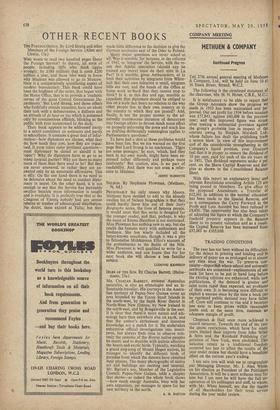OTHER RECENT BOOKS
WHO wants to read two hundred pages about the Foreign Service? In theory, all sorts of people, including MPs who think (quite wrongly, by £180 million) that it costs £200 million a year, and those who want to know why Maclean was allowed to go to Moscow. Here is a comparatively scintillating aspect of modern bureaucrat :This book could have been the brightest of the series, that began with the Home Office, that is to provide a 'readable survey of the great Central Government De- partments.' But Lord Strang, and those others who faithfully remain nameless, have set about their task with a defensiveness, a dullness and an attitude of de /taut en has which is possessed only by conscientious officials, blinking at the public with eyes accustomed to the dark.
Their book appears to be addressed partly to a select committee on estimates and partly to schoolboys. It contains a great deal of infor- mation—how diplomats are chosen, what they do, how much they cost, how they are organ- ised. It even raises some pertinent questions— must diplomacy be closed or should it be 'open'? Why do diplomats have to go to so many cocktail parties? Why are there so many more of them than there used to be? But they are never answered, or rather they are an- swered only by an automatic affirmative. This is silly. On the one hand there is no need to be defensive about the need to conduct diplo- macy in secret. On the other hand, it is not enough to say that the Service has inevitably swollen because more information is sought and is available. It is perfectly true that at the Congress of Vienna nobody had any census returns or studies of ethnological distribution. No doubt, these existed at Yalta; but they
made little difference to the decision to give the German territories east of the Oder to Poland.
Many major questions are never asked at all. Was it sensible, for instance, in the reforms of 1943, to 'integrate' the Service, with the re- sult that Arabic specialists (should any be trained any more) must do their stint in La Paz? Is it sensible, given Ambassadors, so to limit their activities by telegrams from White- hall that their own initiative is small, telegram bills are vast, and the heads of the Office at home work so -hard that they cannot stop to think? Is it, in this day and age, sensible or expedient that diplomats should be obliged to live on a scale that bears no relation to the way other people live in their own country or in the country to which they are posted? And, finally, is not the proper answer to the ad- mittedly troublesome intrusion of democracy into foreign affairs to devote much more effort on properly informing the press and much less on drafting deliberately meaningless replies to Parliamentary questions?
To have had a shot at these problems would have been fun. But we are warned on the first page that Lord Strang is no marksman. 'T ere are some passages,' he says, 'which, had they been in my own words, might have been ex- pressed rather differently and perhaps more cautiously.' But caution, alas, is no part of readability. And there was not even a refer- ence to Maclean.
JENNY NASMYTH










































 Previous page
Previous page